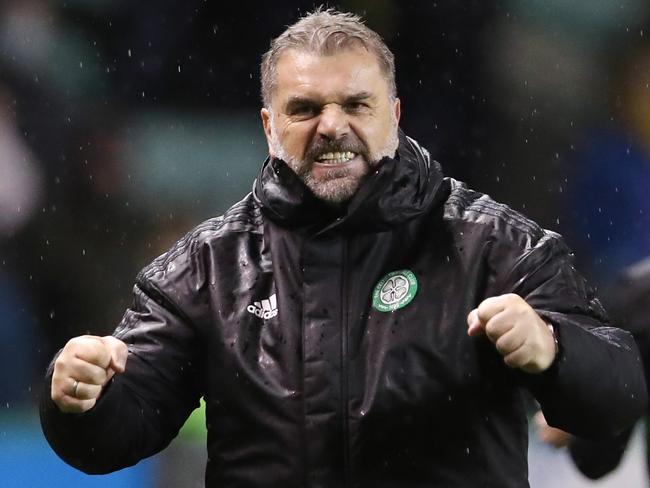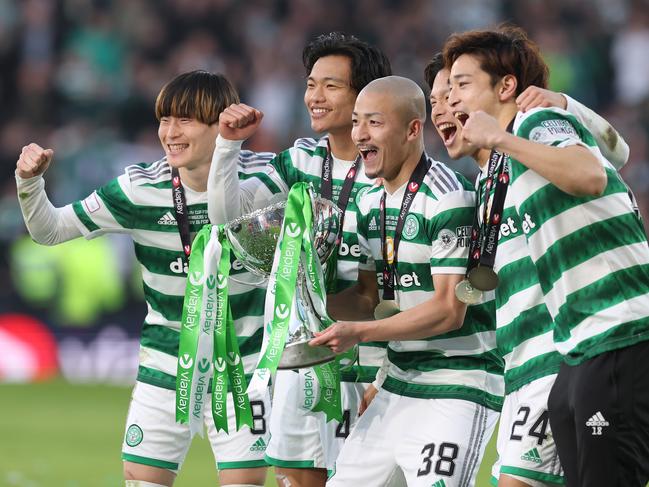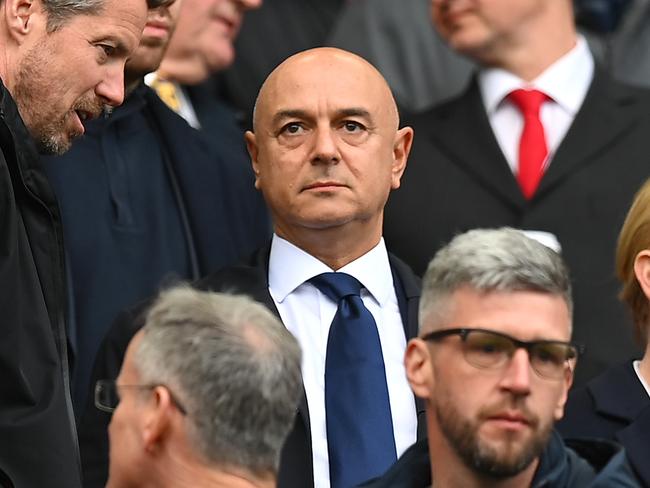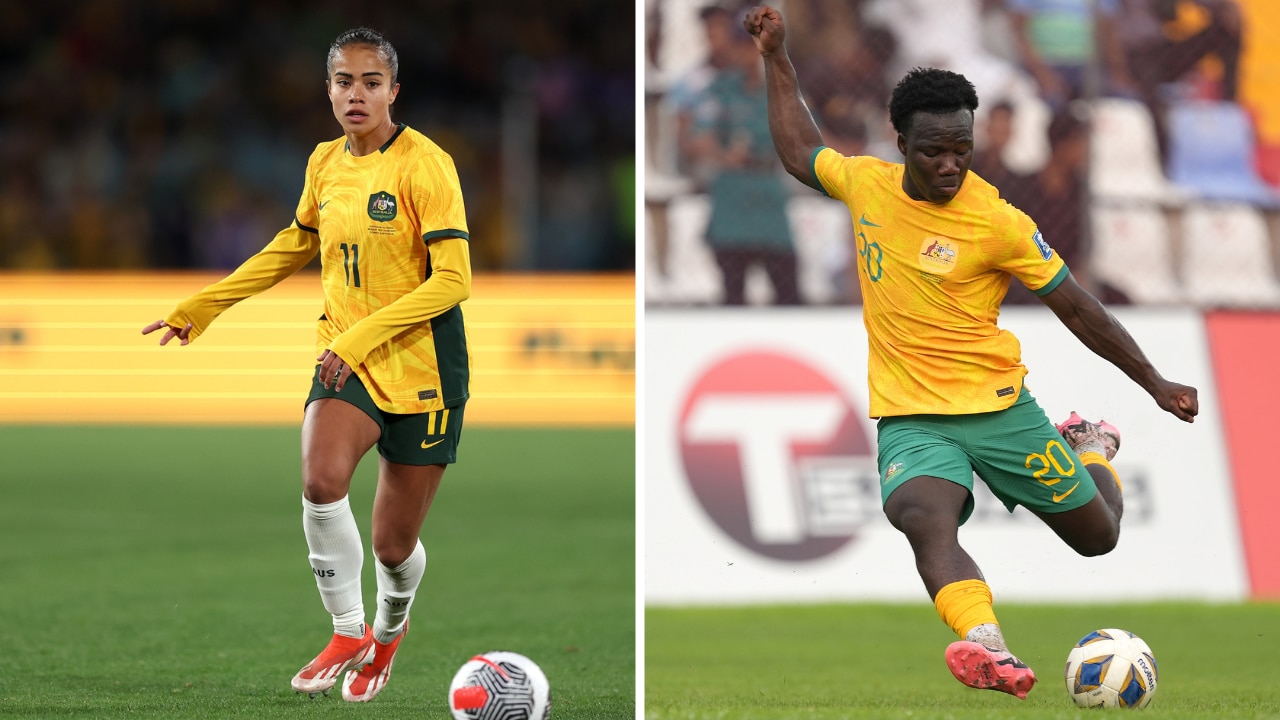A gruff loner who can bristle, but a manager who brings joyous football: How Scotland saw Ange Postecoglou
Ange Postecoglou felt he was dismissed as a joke when he arrived at Celtic but he loves proving people wrong. He won’t hold back at Tottenham, writes The Times’ Scottish Football Correspondent MICHAEL GRANT.

Football
Don't miss out on the headlines from Football. Followed categories will be added to My News.
It seems appropriate that the man about to fill the head coach’s chair at Tottenham Hotspur has a story about what he calls “the death seat”. The Premier League will get used to Ange Postecoglou’s mannerisms and notice that one of his conversational quirks is to finish a comment with “mate”.
Sometimes there is warmth in the word, sometimes there is an accompanying glare and the room temperature drops a little. In reality, the Australian won a vast army of admirers in one half of Glasgow, but he made very few new close friends, and did not seek them.
Spurs’ next head coach is a bit of a loner. He can be charming and has a dry wit, but he holds a lot back and can often seem gruff. He tells a story against himself about being quite content to sit through a long-haul flight without saying a single word to the passenger beside him, the unfortunate occupant of the death seat.
At social events and awards dinners as Celtic manager he would dutifully attend, but he was generally happiest when getting away early to return home to his wife and two young sons. When he was winning, which was nearly all the time in Scotland, that inscrutability made him seem charismatic and strong. That he wants to take his assistant manager, John Kennedy, with him to London is surprising only because he usually moves to a new club without any entourage at all.
Postecoglou has the mental strength to handle that. After the Scottish Cup final on Saturday, he recounted being dismissed as “a joke” and his appointment being mocked and ridiculed when he came to Celtic two years ago. Alan Brazil, on talkSPORT, did famously groan and ask on air if the breaking news was a wind-up, for which the presenter (and Celtic fan) subsequently apologised, but actually much of the media coverage at the time was merely inquisitive and positive.
😩 ð—•ð—¿ð—®ð˜‡ð—¶ð—¹: “Is this a wind up? Where do they come up with these guys from?â€
— talkSPORT (@talkSPORT) June 3, 2021
🤣 ð— ð—°ð—–ð—¼ð—¶ð˜€ð˜: “I shouldn’t wallow in your despair but I’m loving every minute.â€
Alan Brazil isn’t feeling overly positive about #CelticFC looking to appoint Ange Postecoglou... 🀠pic.twitter.com/Ws2lP5KIU6
Postecoglou has always bristled at the lack of respect and opportunity given to Australians in mainstream European football, hence his gratitude to Celtic for employing him and their supporters for embracing him when scepticism was understandable. The cycle seems to be starting again given the response of some underwhelmed Spurs fans, who feel he has a long name without being a big one. Yet he seems to use all of that as fuel rather than being remotely hurt by any of it.
Initially, Spurs wanted a younger head coach, but Postecoglou’s age - 57 - has been an asset in the madhouse of Glasgow. He has seemed substantial and unflappable, calm in the eye of the Old Firm storm. He revels in proving people wrong and a rock-solid self-belief empowers him to insist that he is a serial winner whose methods have been successful everywhere he has been. It is a career that started from nothing. Recently a photograph surfaced on social media of a five-year-old Postecoglou posing sternly for the camera and holding a card showing the No 24, his immigration number, to officials. It was 1970 and his family had made the 30-day boat trip to leave the political upheaval of their native Greece for a new life in Melbourne. He has always marvelled at his parents’ selflessness and dedication.
Ange Postecoglou as a 5-y-o holding up his immigration number on arrival in Melbourne from Athens by boat in 1970. pic.twitter.com/4e4lHOvu3N
— AustralianStory (@AustralianStory) November 16, 2015
His father, Jim, was the inspirational figure in his life and the man he always attempted to please. He still does, five years after his death. “The root and foundation of who I am is no longer by my side,” Postecoglou wrote back then. “Where is the purpose now? His voice is in my head. The flame he lit is still there. I need to keep honouring his sacrifices.”
Jim Postecoglou was old school, gave him tough love, didn’t dish out cuddles, was his biggest critic, and the pair of them bonded over football. They would watch Match of the Day on television in Australia and the young Postecoglou would devour copies of Shoot and Roy of the Rovers when they finally arrived, weeks late, at his local newsagent. He always felt answerable to his father as his career grew and he managed his country at the 2014 World Cup and won league titles in Australia, Japan and Scotland. “He would always point out the entertainers and the teams that were scoring goals. I’ll sometimes have an ugly 1-0 win and I know what he’s saying: ‘Don’t celebrate because that was crap.’ ”
Celtic were toxic when Postecoglou arrived to inherit a broken squad that had finished 25 points behind Rangers. Key players who wanted to leave were moved out and he brought in the cavalry, delivering one hit signing after another. By Scottish standards he was given plenty to spend, but across two seasons his judgment was outstanding.
Kyogo Furuhashi and Reo Hatate led a skilful batch of arrivals from the J-League. There was the exciting Portuguese winger Jota, the young Israeli Liel Abada on the other flank, the solid Cameron Carter-Vickers, from Tottenham, in defence, the Canadian warrior Alistair Johnston at right back, Joe Hart in goal and, perhaps most impressively, the midfielder Matt O’Riley, an unheralded pounds 1.5 million capture from Milton Keynes Dons. All of them became huge contributors. After a rocky start, including elimination from the Champions League, his team dominated Rangers and ploughed through Scottish football.

The obvious issue for Spurs is that Postecoglou raiding his former leagues for players he knows would not have the same effect for them that it had in Glasgow. There are not J-League or SPFL players who will turn Spurs into a top-four team. He drove through a huge turnover of players at Celtic and from the group he inherited only Callum McGregor and Greg Taylor continued as regular starters. Both responded to him and played some of the best football of their careers, but otherwise he generally brought in his own men. If he follows his Celtic modus operandi there will be a huge, costly and unsentimental overhaul of the Spurs squad.
After Midtjylland put them out of the Champions League in his opening games, Postecoglou gave a subtle but loaded response when asked if the Celtic board had failed to realise the need for an immediate recruitment drive: “I think I’ve been pretty consistent in saying we need more players in. Maybe I wasn’t clear enough . . .”
Generally, his relationship with the Celtic hierarchy was harmonious, although that cooled over recent days. He will have to build an understanding with the demanding and impatient Spurs chairman, Daniel Levy.

Postecoglou can bristle when he feels he is being criticised. After the Rangers manager, Michael Beale, called him a “lucky man” - alluding to the advantages a Celtic manager has - Postecoglou harked back to it for months. Now he will have to handle scrutiny at a club who may win less than half of their league games and probably no trophies, as opposed to almost 85 per cent of games and most of the competitions, as Celtic do. Spurs fans will enjoy Postecoglou’s exciting commitment to attack: 4-3-3, inverted full backs swelling the midfield, a No 6 behind two eights, and two wide men staying high and coming inside or delivering ammunition to a clinical centre forward or midfield runners. There is relentless energy and movement, playing out from the back at pace. At its best, it is a joy. An obvious caveat is that it is all very well showing the full plumage against Dundee United, Ross County and Kilmarnock. Against far better teams, Celtic won only six of his 20 games in Europe and, removing qualifiers, only three of 14 in the Champions, Europa and Conference Leagues proper.
On average, they conceded more than two goals a game in Europe. In a group stage with Real Madrid, RB Leipzig and Shakhtar Donetsk, they went for it and made chances in all six matches but scored only four times from 82 efforts on goal and conceded 15 times from the opposition’s 79 attempts. European sides enjoyed playing against them and his teams will have to be tighter. But a man approaching 60 who adapted to football in Japan and Scotland should be capable of adapting to north London too as he takes on a far higher standard of domestic football. So far he has risen to meet every challenge.
He was second choice after Eddie Howe at Celtic, but quickly jumped when they turned to him, just as he has after Arne Slot rejected Spurs. He will feel reassured from a sense that the old cycle is starting again, with scepticism and “Google taking a battering” on his surname as a new set of fans in a new country do their detective work on him. In Postecoglou’s mind, at least, he has taken a new job having seen it all before.
Originally published as A gruff loner who can bristle, but a manager who brings joyous football: How Scotland saw Ange Postecoglou


